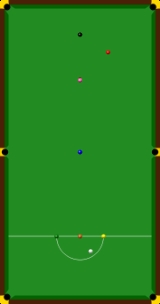
Sinuca Brasileira
Encyclopedia
Sinuca brasileira often simply called sinuca, is a cue sport played on a snooker table, using only one instead of snooker
's fifteen, with the normal six of the standard set of snooker balls. The balls carry the same basic values as in snooker, and, like in other pocket billiards
games, a white is used to the red and other coloured balls. The game is played almost exclusively in Brazil
, and is little known outside this region.
The colours are set up on their normal as in snooker, and the remaining red ball is placed halfway between the and the right side . The cue ball is placed in . The opening player may move the ball anywhere within the "D" before playing. After this, players will only have a chance to move the cue ball when an occurs, and the incoming opponent will get , permitting placement of the cue ball anywhere within the "D".
The first shot must be played so that the red ball is contacted, however, it is not permitted to either pocket the red ball or leave the opponent snookered.
A player at his turn on the table has a choice to either shoot for the ball with the lowest point value (a free shot) or any other ball (a penalty shot). If the player plays a free shot, he must proceed with a continuation shot, and the free ball remains out of the game. Any ball may be nominated as the ball on for the continuation shot and it is respotted after it is pocketed. Missing either the free shot or the continuation shot ends the player's inning. However, if the player elects to shoot the penalty shot, the penalty ball is respotted and his next shot must be a free shot. Differently from free shots and continuation shots, missing a penalty shot is not only the end of an inning, but also a foul.
Every foul awards the opponent with 7 points. All other rules are the same as in snooker, although , and other combination shots are automatically illegal because all the balls are different colours.
Snooker
Snooker is a cue sport that is played on a green baize-covered table with pockets in each of the four corners and in the middle of each of the long side cushions. A regular table is . It is played using a cue and snooker balls: one white , 15 worth one point each, and six balls of different :...
's fifteen, with the normal six of the standard set of snooker balls. The balls carry the same basic values as in snooker, and, like in other pocket billiards
Pocket billiards
Pool, also more formally known as pocket billiards or pool billiards , is the family of cue sports and games played on a pool table having six receptacles called pockets along the , into which balls are deposited as the main goal of play. Popular versions include eight-ball and nine-ball...
games, a white is used to the red and other coloured balls. The game is played almost exclusively in Brazil
Brazil
Brazil , officially the Federative Republic of Brazil , is the largest country in South America. It is the world's fifth largest country, both by geographical area and by population with over 192 million people...
, and is little known outside this region.
Rules
The ball value is the same as in standard snooker (red = 1, yellow = 2, = 3, = 4, = 5, pink = 6, = 7) and is awarded to a player after the corresponding ball is legally potted.The colours are set up on their normal as in snooker, and the remaining red ball is placed halfway between the and the right side . The cue ball is placed in . The opening player may move the ball anywhere within the "D" before playing. After this, players will only have a chance to move the cue ball when an occurs, and the incoming opponent will get , permitting placement of the cue ball anywhere within the "D".
The first shot must be played so that the red ball is contacted, however, it is not permitted to either pocket the red ball or leave the opponent snookered.
A player at his turn on the table has a choice to either shoot for the ball with the lowest point value (a free shot) or any other ball (a penalty shot). If the player plays a free shot, he must proceed with a continuation shot, and the free ball remains out of the game. Any ball may be nominated as the ball on for the continuation shot and it is respotted after it is pocketed. Missing either the free shot or the continuation shot ends the player's inning. However, if the player elects to shoot the penalty shot, the penalty ball is respotted and his next shot must be a free shot. Differently from free shots and continuation shots, missing a penalty shot is not only the end of an inning, but also a foul.
Every foul awards the opponent with 7 points. All other rules are the same as in snooker, although , and other combination shots are automatically illegal because all the balls are different colours.

